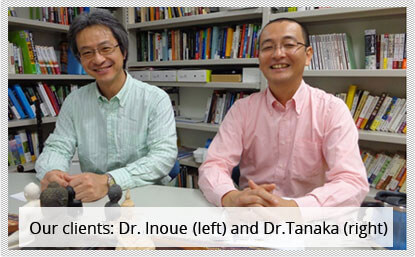

This was the first time I used a translation service. Initially, I was worried about making a lot of revisions to the translated manuscript, but when I saw the quality of the translated batches, I realized that there was little for me to change. The translators understood my Japanese very well! There were some portions in the Japanese text that were very difficult to read and understand, but they did a fantastic job in understanding the meaning and translating it into English.
Our book had more than 10 chapters written by many different authors. It covered a wide range of subjects, i.e., Forestry, Anthropology, and Sociology. We knew that translation of this multidisciplinary book would not be possible by a single translator with expertise in just one area. Ulatus did an excellent job in handling a wide range of disciplines and using subject experts for translation.
Also, Ulatus set up a process where authors received interim translated files for review. After the author suggestions were incorporated in the translation, native checkers polished the English. I was so impressed to see that the native checkers made all the required revision to the files. I’m convinced that they did not cut corners.
On one hand, I felt that the advantage of using Ulatus’ service was that the native translators translated verbose Japanese expressions into English in a direct and concise manner. On the other hand, I felt that such concise expressions may not convey the same impact as desired by the author. However, I realize that authors need to take care of these aspects when checking the translation and it might be wrong to expect the translators to know what authors would want in such situations.
We received a strong support throughout the project from all the representatives across different teams including the core translation team as well as the client servicing team. As the final deadline approached, we got very busy managing this project. In such times, if we wanted any response or clarification, Ulatus gave us a quick response and took care of all our queries. I cannot think of any area where the service was lacking.
One learning from the process was to carefully decide and coordinate on selecting the translation style. When we approached Ulatus, we asked for literal translation so that the meaning is accurately conveyed in English. Like I said earlier, this was the first time we were trying a translation service. So literal translation seemed appropriate and trustworthy. But when the authors reviewed the translation style, they wanted the text to be more fluent, which is contradictory to the literal style, and the authors were taking a lot of time to make that change. On sharing this issue with Ulatus, we received the recommendation of using the Paraphrasing style. We reviewed some samples from Ulatus and agreed that this style will save a lot of time on the author’s end and would be more suitable for the book. So right in the middle of the project, Ulatus changed the style from literal to paraphrasing. We are so thankful to Ulatus for accommodating this change.
The interesting thing I learnt from this experience is the difference in Western and Japanese writing styles and how it influences the quality of translation. In the Western style writing, the main idea or the punch line is presented at the beginning followed by the explanation. The Japanese writing, however, is quite the contrary. The explanation of the main idea comes at the beginning and the conclusion is presented at the end. So from my experience, simply translating Japanese books word for word into English will not result in a fluent text. What is your view on this at Ulatus?
Although the main translation process is over, we will still need your help with the title of the English edition, galley proofreading, binding, and printing of the book.
The reason for the stupendous success of this assignment was the exceptional cooperation by our client. In order to provide the best quality output, during the project meeting, we requested the client to extend the support required for the smooth progress of this project. Mr. Inoue, Mr. Tanaka, and the University of Tokyo Press willingly accepted our request. In addition, we are extremely glad that the authors provided complete cooperation and understanding despite their busy schedule. The closely collaborated efforts of the University of Tokyo Press and Ulatus have therefore produced a splendid book.
